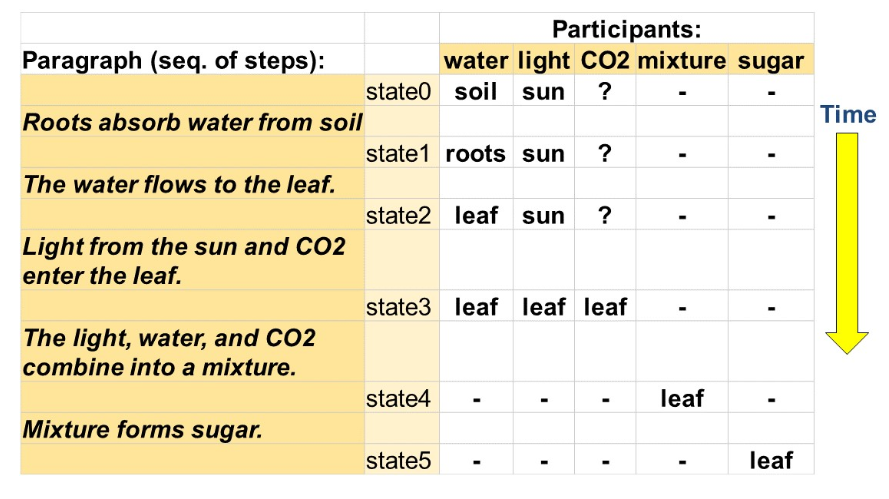Pytorch implementation of KnOwledge-Aware proceduraL text understAnding model on ProPara dataset (WWW 2021 long paper). The KOALA model achieves state-of-the-art results on ProPara dataset on September 2020 (leaderboard).
KOALA uses the ProPara dataset collected by AI2. This dataset is about a reading comprehension task on procedural text, i.e., a text paragraph that describes a natural process (e.g., photosynthesis, evaporation, etc.). AI models are required to read the paragraph, then predict the state changes (CREATE, MOVE, DESTROY or NONE) as well as the locations of the given entities.
AI2 released the dataset here in the form of Google Spreadsheet. We need three files to run the KOALA model, i.e., the Paragraphs file for the raw text, the Train/Dev/Test file for the dataset split, and the State_change_annotations file for the annotated entities and their locations. I also provide a copy in data/ directory which is identical to the official release.
-
Create a virtual environment with python >= 3.7.
-
Install the dependency packages in
requirements.txt:pip install -r requirements.txt
-
If you want to create your own dataset using
preprocess.py, you also need to download the en_core_web_sm model for English language support of SpaCy:python -m spacy download en_core_web_sm
-
Download the dataset or use my copy in
data/. -
Process the CSV data files:
python preprocess.py
By default, the files should be put in
data/and the output JSON files are also stored indata/. You can specify the input and output paths using optional command-line arguments. Please refer to the code for more details of command-line arguments.P.S. Please download the files in CSV format if you want to process the raw data using
preprocess.py.P.P.S. If you choose to pre-process your own data, your dataset will get different orders of location candidates (compared to my copy in
data/) due to the randomness of python set. This will lead to slightly different model performance due to the existence of dropout.Time for running the pre-process script may vary according to your CPU performance. It takes me about 50 minutes on a Intel Xeon 3.7GHz CPU.
-
Train a KOALA model:
python train.py -mode train -ckpt_dir ckpt -train_set data/train.json -dev_set data/dev.json\ -cpnet_path CPNET_PATH -cpnet_plm_path CPNET_PLM_PATH -cpnet_struc_input -state_verb STATE_VERB_PATH\ -wiki_plm_path WIKI_PLM_PATH -finetune
where
-ckpt_dirdenotes the directory where checkpoints will be stored.CPNET_PATHshould point to the retrieved ConceptNet knowledge triples.STATE_VERB_PATHshould point to the co-appearance verb set of entity states. My copy of these two files are stored inConceptNet/result/. Please refer toConceptNet/for more details of generating these files from scratch.CPNET_PLM_PATHshould point to the BERT model pre-fine-tuned on ConCeptNet triples.WIKI_PLM_PATHshould point to the BERT model pre-fine-tuned on Wiki paragraphs. My copy of pre-fine-tuned encoders are stored in Google Drive. Please refer towiki/andfinetune/for more details of collecting Wiki paragraphs and fine-tuning BERT encoders.Some useful training arguments:
-save_mode Checkpoint saving mode. 'best' (default): only save the best checkpoint on dev set. 'all': save all checkpoints. 'none': don't save checkpoints. 'last': save the last checkpoint. 'best-last': save the best and the last checkpoints. -epoch Number of epochs to run the dataset. You can set it to -1 to remove epoch limit and only use early stopping to stop training. -impatience Early stopping rounds. If the accuracy on dev set does not increase for -impatience rounds, then stop the training process. You can set it to -1 to disable early stopping and train for a definite number of epochs. -report The frequency of evaluating on dev set and save checkpoints (per epoch).Time for training a new model may vary according to your GPU performance as well as your training schema (i.e., training epochs and early stopping rounds). It takes me about 1 hour to train a new model on a single Tesla P40.
-
Predict on test set using a trained model:
python -u train.py -mode test -test_set data/test.json -dummy_test data/dummy-predictions.tsv\ -output predict/prediction.tsv -cpnet_path CPNET_PATH -cpnet_plm_path CPNET_PLM_PATH\ -cpnet_struc_input -state_verb STATE_VERB_PATH -wiki_plm_path WIKI_PLM_PATH -restore ckpt/best_checkpoint.ptwhere -output is a TSV file that will contain the prediction results, and -dummy_test is the output template to simplify output formatting. The
dummy-predictions.tsvfile is provided by the official evaluation script of AI2, and I just copied it todata/. -
Run the evaluation script using the ground-truth labels and your predictions:
python evaluator/evaluator.py -p data/prediction.tsv -a data/answers.tsv --diagnostics data/diagnostic.txt
where
answers.tsvcontains the ground-truth labels, anddiagnostic.txtwill contain detailed scores for each instance.answers.tsvcan be found here, or you can use my copy indata/.evaluatordirectory contains the evaluation scripts provided by AI2.
We have uploaded the trained model & the output predictions to Google Drive. Uploading this trained model during test time can reproduce the 70.4 F1 score as shown on the leaderboard.
For more issues regarding training your own model to reproduce the results, please refer to our post in Issues.
Please kindly cite our paper if you find our work useful.
@inproceedings{zhang2021koala,
author = {Zhihan Zhang and
Xiubo Geng and
Tao Qin and
Yunfang Wu and
Daxin Jiang},
title = {Knowledge-Aware Procedural Text Understanding with Multi-Stage Training},
booktitle = {{WWW} '21: The Web Conference 2021, Ljubljana, Slovenia, April 19--23, 2021},
year = {2021}
}
